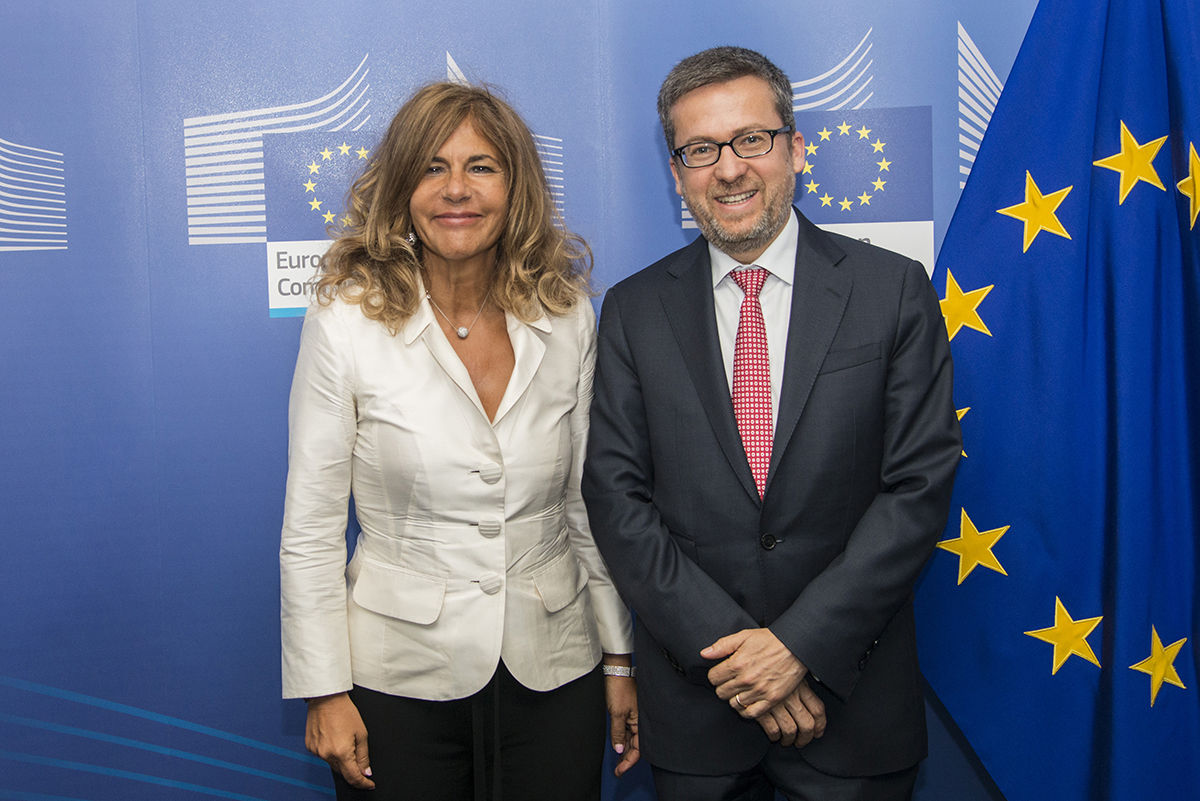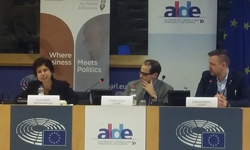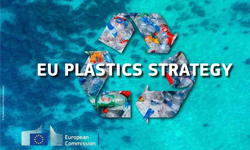BusinessEurope Headlines No. 2018-09
EU must be committed to supporting industrial technologies

In a letter to Carlos Moedas, the European Commissioner for Research, Science and Innovation, Emma Marcegaglia, President of BusinessEurope, and Markus J. Beyrer, Director General, expressed serious concerns that the possible new structure of the 9th EU framework programme for research and innovation (FP9) would imply a decrease of EU funding for industry-led projects and key enabling technologies. At a time where global players are taking bold actions, it is crucial that Europe scales-up funding for research and innovation, Marcegaglia and Beyrer stated. They also called for clarity and certainty that Europe is committed to supporting industrial technologies as a mean to tackle societal challenges.
Photo copyright: European Commission
![]() Contact: Alexandre Affre
Contact: Alexandre Affre
Video messages on BusinessEurope Day
Watch the full speech of Donald Tusk, President of the European Council, Jyrki Katainen, Vice-President of the European Commission, Michel Barnier, Chief Negotiator - Task Force for the Preparation and Conduct of the Negotiations with the United Kingdom under Article 50 TEU, Emma Marcegaglia, President of BusinessEurope, Markus J. Beyrer, Director General, and others.
Our comment
US additional duties on steel and aluminium would put us on the verge of a trade war
By Eleonora Catella, Senior Adviser for International Relations
 In a letter to the US Commerce Secretary Wilbur Ross, President Emma Marcegaglia expressed her confidence that the US will finally decide not to impose 25% additional duties on steel and 10% aluminium, or at least that the EU, as a key strategic partner, will be exempted. President Trump announced those measures on 1 March. The duties, authorised under Section 232 of the Trade Expansion Act of 1962, would be imposed on the basis of national security against all countries and “for a long period of time”.
In a letter to the US Commerce Secretary Wilbur Ross, President Emma Marcegaglia expressed her confidence that the US will finally decide not to impose 25% additional duties on steel and 10% aluminium, or at least that the EU, as a key strategic partner, will be exempted. President Trump announced those measures on 1 March. The duties, authorised under Section 232 of the Trade Expansion Act of 1962, would be imposed on the basis of national security against all countries and “for a long period of time”.
BusinessEurope is extremely concerned that these duties, if confirmed, would bring the world on the verge of a trade war, creating a far-reaching disruption in world trade with consequences along the supply chains of many different industrial sectors that depend on these inputs, as well as on consumers. The repercussions of the additional duties will be felt by European and US companies alike. They will inevitably trigger countermeasures that risk having a very negative impact on the overall economic growth and the business environment. Announcements of swift and tough reactions by several members of the World Trade Organisation (WTO), including the EU, Japan, and China, have already followed suit. This will impact negatively the agenda of growth and jobs promotion in the US and Europe.
The EU and the US have a long-standing and close relation centered on investment. European companies based in the United States made $2.4 trillion sales in 2016, more than three times than the US imports from Europe in the same year. The Transatlantic economy represents about 56,1% of the world’s foreign direct investment (FDI) inward stock and 64,3% of the outward stock.
Most of our trade is driven by investments. These figures show the dimension and importance of our relation and how much companies and economies on both sides of the pond are interlinked. Any disruption will surely have an extremely negative impact that goes well beyond products directly affected, as it is the case with the current proposal to impose additional duties on steel and aluminum.
While we share US concerns that some world producers are disregarding repeated calls to address overcapacity and correct market unbalances, we believe unilateral actions will only do more harm than good. Initiatives like the measures proposed are not going to resolve the root causes of problems that are equally felt in the EU and the US – be them sectoral overcapacities, or theft of intellectual property and forced technology transfers.
In particular, we regret that with this announcement President Trump is disregarding the importance of key strategic partners of the US, such as the EU: the announced measures will mainly hit US allies, those that have actively engaged in joint initiatives to fight for level playing field. We sincerely hope this decision will be reconsidered.
![]() Contact: Eleonora Catella
Contact: Eleonora Catella
Backlash against globalisation, a multi-stakeholder approach
 “In times when an open economic system can no longer be taken for granted, it takes a multi-stakeholder approach to convince citizens of the benefits of free trade and investment”, said Luisa Santos, Director for International Relations at BusinessEurope, at the event “Harnessing globalisation - at what cost? - Why free trade matters and what we stand to lose from a backlash against globalisation”. Organised by the Society for Politics & Business and the Confederation of Swedish Enterprise and hosted by the European Parliament on 7 March 2018, the event gathered representatives of European business and EU institutions to discuss the role that globalisation has played in European prosperity and what would be the impact if citizens cannot be convinced of its benefits, anymore. Santos stated that with the liberal economic system being increasingly challenged worldwide, many people have forgotten how much Europe has gained from being open to trade and investment. From increased real wages to lower consumer prices or access to more innovative high-quality products and services, important gains from global economic integration could be lost if trust in globalisation continues to erode. Therefore, “politics, business and civil society must cooperate to counter the backlash against globalisation”, Santos concluded.
“In times when an open economic system can no longer be taken for granted, it takes a multi-stakeholder approach to convince citizens of the benefits of free trade and investment”, said Luisa Santos, Director for International Relations at BusinessEurope, at the event “Harnessing globalisation - at what cost? - Why free trade matters and what we stand to lose from a backlash against globalisation”. Organised by the Society for Politics & Business and the Confederation of Swedish Enterprise and hosted by the European Parliament on 7 March 2018, the event gathered representatives of European business and EU institutions to discuss the role that globalisation has played in European prosperity and what would be the impact if citizens cannot be convinced of its benefits, anymore. Santos stated that with the liberal economic system being increasingly challenged worldwide, many people have forgotten how much Europe has gained from being open to trade and investment. From increased real wages to lower consumer prices or access to more innovative high-quality products and services, important gains from global economic integration could be lost if trust in globalisation continues to erode. Therefore, “politics, business and civil society must cooperate to counter the backlash against globalisation”, Santos concluded.
Contact: Eleonora Catella
Plastics Strategy: Environment ministers should continue strong dialogue with EU business
 “BusinessEurope has welcomed the European Commission’s proposal on the Plastics Strategy as published on 16 January 2018, because it seems to strike the right balance between environmental and economic considerations”, said BusinessEurope Director General Markus J. Beyrer in a letter to the Bulgarian Environment Minister Neno Dimov, ahead of the Environment Council that took place on Monday 5 March 2018. In the letter, BusinessEurope calls on environment ministers to continue the strong stakeholder dialogue approach as the European Commission is having
“BusinessEurope has welcomed the European Commission’s proposal on the Plastics Strategy as published on 16 January 2018, because it seems to strike the right balance between environmental and economic considerations”, said BusinessEurope Director General Markus J. Beyrer in a letter to the Bulgarian Environment Minister Neno Dimov, ahead of the Environment Council that took place on Monday 5 March 2018. In the letter, BusinessEurope calls on environment ministers to continue the strong stakeholder dialogue approach as the European Commission is having. Furthermore, there should be more focus on digitalisation and consumers, a life-cycle approach based on a common EU methodology for recycled plastics, and more actions taken at the global level to ensure a level-playing field between EU-produced and imported plastic products.
![]() Contact: Leon de Graaf
Contact: Leon de Graaf
Amendments to associates and joint ventures accounting must be reassessed
 BusinessEurope has written to the International Accounting Standards Board (IASB) and the European Financial Reporting Advisory Group (EFRAG) to express concerns regarding proposed amendments to the international accounting standard concerning investments in associates and joint ventures. It is highly debatable whether the amendments will improve financial reporting to any significant extent, other than to avoid anticipated diversity in accounting. In addition, the conceptual and practical issues raised demonstrate that the priority of the project relating to equity-accounted investments must be reassessed.
BusinessEurope has written to the International Accounting Standards Board (IASB) and the European Financial Reporting Advisory Group (EFRAG) to express concerns regarding proposed amendments to the international accounting standard concerning investments in associates and joint ventures. It is highly debatable whether the amendments will improve financial reporting to any significant extent, other than to avoid anticipated diversity in accounting. In addition, the conceptual and practical issues raised demonstrate that the priority of the project relating to equity-accounted investments must be reassessed.
![]() Contact: Erik Berggren
Contact: Erik Berggren
Circular Economy Industry Platform: more than 120 examples published
Contact: Leon de Graaf
Calendar
- 12 March: Competitiveness Council
- 13 March: Banking Union package
- 13 March: Future of EU energy and climate policy
- 13 March: Social Fairness package
- 15 March: Employment Council
- 18 March: Russia presidential elections
